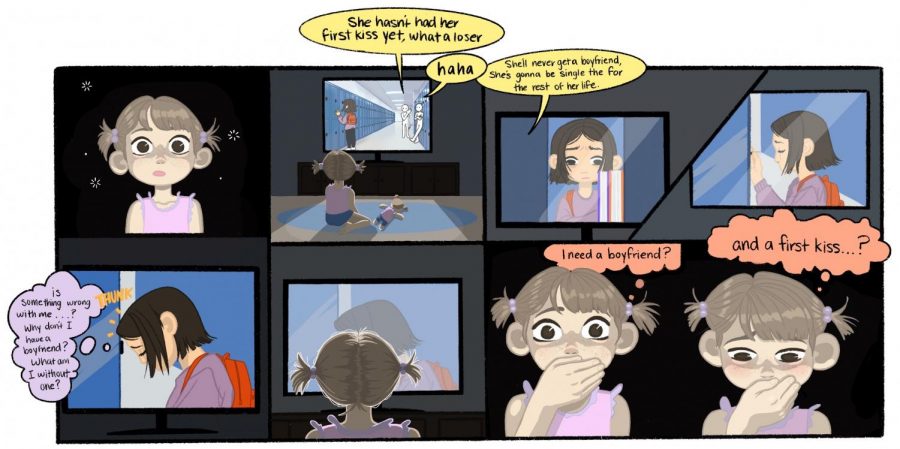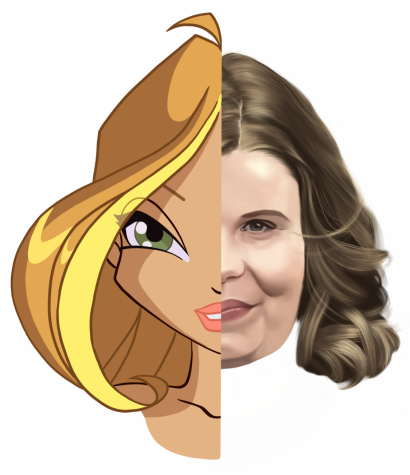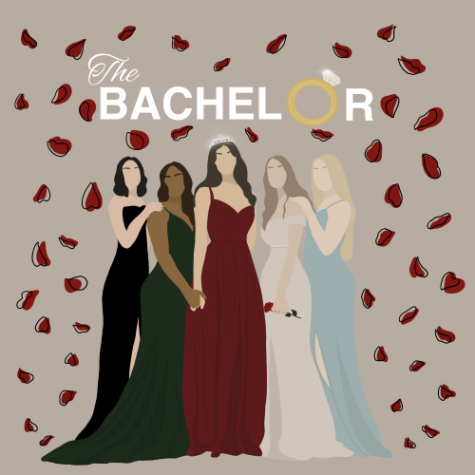Too Much Romance on Teen TV
Many of today’s most popular TV shows that are geared to preteens and teens promote romantic relationships, potentially harming a child’s self-esteem and rushing them into adulthood.
Remember when we were kids? We watched Dragon Tales, Caillou, and The Backyardigans. These show’s stories were often about adventure, travel, and essential life lessons. But television for kids today focuses less on the simplicity and freedoms of childhood, and focuses more on romantic relationships. “Kids'” TV is changing the definition of what it means to be young.
Children and teens are subjected daily to the idea that being alone is not enough. Young boys and girls are taught by TV that one must have a boyfriend or girlfriend, or even have a first kiss, before high school, and to be honest, this message of childhood romance is a bit gross. TV shows should promote child-appropriate content instead of subjecting children to stories about romantic relationships.
The show Ashley Garcia: Genius in Love was released on Netflix this year with a G-rating. The show is about a high school-aged girl focusing on engaging in a relationship with a boy she likes. The problem: the series only focuses on this, so much so that even its tagline reads, “This time the relationships, crushes and conflicts are soaring to all new heights.” So much for learning about the mind of the fictional “genius.” Instead of diving deeper into her intellect, viewers dive deeper into her desperation for validation from an arbitrary boy.
Young boys and girls are easily influenced by these shows, and not for the better: Studies show that girls are already dating as early as 12-and-a-half years old, and boys a year older.
Even worse, series like Ashley Garcia: Genius in Love amplify the hypocrisy of pop culture. Social media is awash in ¨we are strong, independent women; we don´t need a man¨ chants, but shows like Ashley Garcia: Genius in Love, High School Musical: The Musical: The Series (in which “show-mances blossom”), and Andi Mack (there’s an episode entitled “Jonah and Andi Kiss”) have girls chasing boys as major plot threads. The world wants girls to live by the “independent woman” mantra, but then shows like these feature romantic relationships, at the expense of far more important lessons about a woman’s strength, independence, and potential. These TV shows continue to depict girls seeking boys, unfortunately and irresponsibly promoting the idea that girls are nothing on their own if they don’t have a boyfriend or romantic interest.
Fortunately, there are shows that promote important values — friendship, family loyalty, school pride — to girls, like Liv and Maddie, which is about the sisterly bond of friendship and support. Sure, they both have boyfriends, but the focus of the series isn’t on romantic relationships. Instead, the emphasis is ¨sisters by chance, friends by choice.¨ The show does not promote cliches like ¨fries before guys¨ or ¨bros before hoes”; instead, in Liv and Maddie, the main focus is family.
A.N.T. Farm and Sam and Cat are other shows that don’t hinge on romantic relationships, but instead, emphasize adventure, independence, and coming-of-age. The relationships on the show are merely subplots to larger and longer stories that teach young children and teens how to grow and build friendships, and to pursue personal goals.
Kids today are already growing up too fast. The emphasis on romantic relationships in popular television is hurting so many people, young girls especially, by causing them to be more insecure and more inclined to find validation in a romantic relationship. Until TV shows geared to kids stop promoting romance, we should protect ourselves, and the next generation, by watching, and demanding more, family-first and wholesome content.
Your donation supports the student journalists at Brea Olinda High School! The contribution will help us purchase equipment, upgrade technology, and cover our annual website hosting costs.
Makayla Huerta, senior, is excited for her third year of illustrating for the Wildcat. She spends her days creating artwork, jamming out to music, and...








